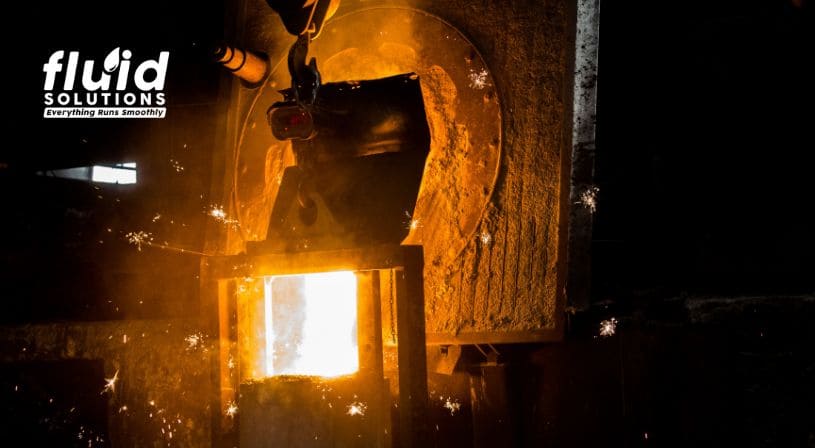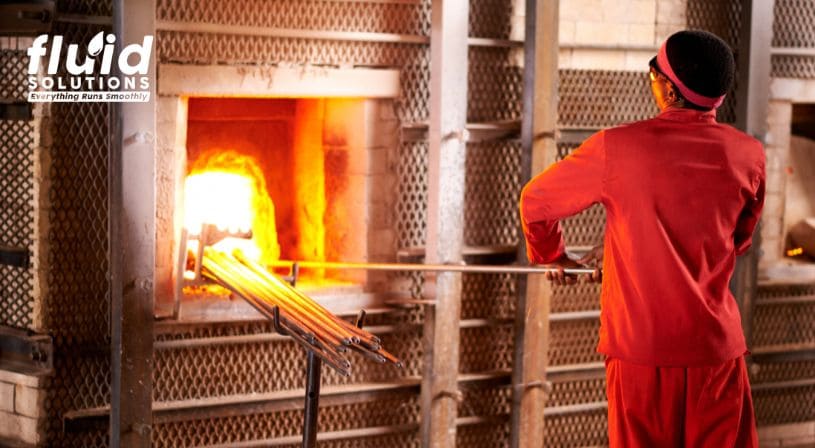
Image Source: https://www.istockphoto.com/photo/metal-casting-process-with-red-high-temperature-fire-in-metal-part-factory-gm1136045938-302436406
Hydraulic fluids are essential for the efficient operation of hydraulic systems, providing lubrication and pump protection to keep equipment running smoothly. Most systems rely on mineral-based hydraulic fluids because of their excellent lubricating properties and relative affordability. However, in certain high-risk environments, such as in Die Casting processes, the need for fire-resistant hydraulic fluids becomes paramount. When a hydraulic line bursts or a leak occurs in a high-temperature setting, such as with Die Casting, using a fire-resistant hydraulic fluid can prevent disastrous consequences.
The Need for Fire-Resistant Hydraulic Fluids (FRHFs)
In environments where hydraulic systems are exposed to open flames, hot surfaces, or molten metal, hydraulic fluid safety is a critical consideration. Fire-Resistant Hydraulic Fluids (FRHFs) play an essential role in these high-risk areas by providing a safer alternative to mineral-based fluids, which are more combustible.
Mineral oils, though highly effective for lubrication, pose significant fire hazards if leaks occur. A lubrication line burst in a hot Die Casting environment can lead to fires that cause extensive damage to equipment, production downtime, and serious safety risks for personnel. These dangers make FRHFs not just a viable option, but many times, a necessity. When choosing between fire-resistant and mineral-based hydraulic fluids, industries must consider safety, especially in applications with high fire risks.
Types of Fire-Resistant Hydraulic Fluids
FRHFs are classified into two main categories: Hydrous (water-containing) and Anhydrous (non-water-containing) fluids. Each type offers varying levels of fire resistance and lubrication performance, and their selection depends on the specific needs of the application.
In this discussion, the focus will be on Hydrous Fire-Resistant Hydraulic Fluids (HFCs), which are widely used in the Die Casting industry because of their balance between fire resistance, lubricating properties, and relative affordability.
Classification and Characteristics of HFC Fluids
HFC-type FRHFs comprise water (around 50%), glycols, and additives, which provide both fire resistance and satisfactory lubrication. With an ISO VG 46 viscosity, these fluids protect hydraulic components comparable to that of mineral oils, while also offering acceptable rust and corrosion protection.
Despite being 2-4 times more expensive than mineral oils, HFC fluids are significantly more affordable than their Anhydrous FRHF counterparts. This cost-benefit balance makes them a popular choice in high-risk applications like Die Casting, where fire resistance is critical.
Benefits of HFC Fluids

Image Source: https://grupogtg.com/trabajar-con-altas-temperaturas/
One of the primary benefits of HFC fluids is their fire resistance, which is vital in high-temperature environments like Die Casting. These fluids not only help protect equipment but also ensure operator safety by minimizing fire hazards.
Modern HFC fluids provide adequate lubrication and corrosion protection of hydraulic components, ensuring that systems remain operational and efficient. This makes them suitable for high-pressure Die Casting machines, where both fire resistance and proper lubrication are required.
Limitations and Challenges of Using HFC Fluids
While HFC fluids offer many advantages, they also come with certain limitations and maintenance challenges. One of the primary drawbacks is the need for constant monitoring of key properties, such as viscosity, water content, pH levels, and bacteria. Because HFC fluids contain water, some of it can evaporate when exposed to high operating temperatures, causing an imbalance in the fluid’s composition. Without regular monitoring, this imbalance can lead to increased viscosity, excessively pressuring the pump, and resulting in sluggish mechanical and hydraulic operations.
Contamination control is equally crucial. Fluid or solid contaminants can degrade the fluid, leading to sludge, rust, corrosion, and poor lubrication performance. Effective hydraulic fluid contamination via filtration control is essential to maintaining system integrity.
Bacterial growth is another concern, as it can lower the pH level and further deteriorate the quality of the fluid. Compared to mineral oils and Anhydrous FRHFs, which are easier to use in a “plug-and-play” manner, HFC fluids require more attention and careful hydraulic system maintenance.
When switching to HFC fluids, certain modifications to the hydraulic system may also be necessary. Components like O-rings, seals, paints, and tank metals must be compatible with water-containing fluids to prevent negative reactions that could compromise the system. HFC fluids have limitations regarding the temperatures, speeds, and pressures they can handle, making it important to ensure that the fluid is suitable for specific operating conditions.
OEM Endorsements and Industry Adoption
Recognizing the fire hazards inherent in certain industries, Die-Cast Machine and Hydraulic Original Equipment Manufacturers (OEMs) have approved the use of HFC fluids in specific applications. This endorsement highlights the increasing trust and reliance on HFC fluids for their fire-resistant properties, ensuring that the industry adopts safer, more reliable solutions for hydraulic systems operating in high-temperature environments.
In conclusion, while HFC fluids offer a balanced solution between fire resistance and lubrication, they require more hydraulic system maintenance than both mineral oils and Anhydrous FRHFs. Regular monitoring of water content, viscosity, pH levels, and contamination are important when using HFC fluids.
For industries like Die Casting, where fire hazards are a real concern, choosing the right hydraulic fluid is crucial. Whether opting for HFC fluids or more advanced Anhydrous FRHFs, ensuring the safety of both the equipment and the operators is paramount.
Optimize Safety and Performance with the Right Hydraulic Fluid Solutions
At Fluid Solutions, we understand the critical importance of hydraulic fluid safety in high-risk environments. We offer a wide range of fire resistant hydraulic fluids, including HFC fluids, designed to meet the specific needs of industries like Die Casting. As a leading hydraulic supplier in the Philippines, we are committed to providing top-quality solutions.
Contact Fluid Solutions today at (02) 8370 5928 / (0917) 894 9156 or via email at inquiry@fluidsolutions.com.ph to learn more about our products and get expert advice on selecting the best hydraulic fluid for your operations. Let us help you optimize both safety and performance with the right solutions for your hydraulic systems.


